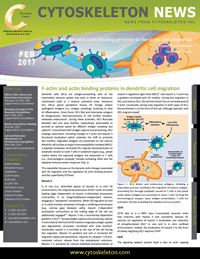February Newsletter: Actin-binding proteins and F-actin in dendrite cell migration
- By Cytoskeleton Inc. - Actin News
- Mar 14, 2017

Dendritic cells (DCs) are antigen-presenting cells of the mammalian immune system that exist in either an immature, unactivated state or a mature, activated state. Immature DCs (iDCs) patrol peripheral tissues for foreign and/or pathogenic antigens (i.e., antigen sampling), localizing to sites of inflammation. Once there, iDCs find and internalize antigens by phagocytosis, macropinocytosis, or cell surface receptor-mediated endocytosis. During these activities, iDCs fluctuate between fast and slow motility, respectively, presumably to provide an optimal speed for efficient antigen sampling and capture. Concomitant with antigen capture and processing, iDCs undergo maturation, including changes in F-actin and myosin II functional localization which underlies the shift to primarily fast motility. Degraded antigens are presented on the mature dendritic cell surface as major histocompatibility complex (MHC)-II-peptide complexes. Activated DCs migrate chemotactically via lymphatic vessels to naïve T cells in lymphoid organs (e.g., lymph nodes) where the captured antigens are presented to T cells (i.e., immunological synapse), thereby activating them and the adaptive immune system response (Fig. 1).
Also included in this newsletter:
- Actin Live Cell Imaging, Acti-Stain™ Phalloidins, Actin Biochem Kits, Actin and Actin Binding Protein Antibodies
- Related Publications

